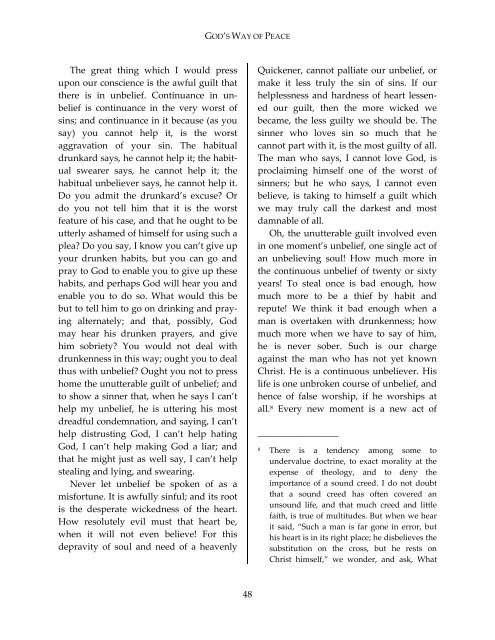God's Way of Peace by Horatius Bonar, D.D.
The seasoned Scottish pastor wrote this short devotional for those suffering from guilt, anxiety, or the consequences of sin. He writes with neither chastisement nor condemnation, but rather immediately directs his readers to Christ’s gift of salvation through his death and resurrection. Bonar reminds all that the Gospel offers hope for the sinner and comfort for the troubled, for God’s perfect, constant grace never fails those who accept it. From Bonar’s time to the present, people have found peace with God afresh through this book. Many people report having read it several times, and turning to it again and again when troubles arise. Kathleen O’Bannon CCEL Staff
The seasoned Scottish pastor wrote this short devotional for those suffering from guilt, anxiety, or the consequences of sin. He writes with neither chastisement nor condemnation, but rather immediately directs his readers to Christ’s gift of salvation through his death and resurrection. Bonar reminds all that the Gospel offers hope for the sinner and comfort for the troubled, for God’s perfect, constant grace never fails those who accept it. From Bonar’s time to the present, people have found peace with God afresh through this book. Many people report having read it several times, and turning to it again and again when troubles arise.
Kathleen O’Bannon
CCEL Staff
Create successful ePaper yourself
Turn your PDF publications into a flip-book with our unique Google optimized e-Paper software.
GOD’S WAY OF PEACE<br />
The great thing which I would press<br />
upon our conscience is the awful guilt that<br />
there is in unbelief. Continuance in unbelief<br />
is continuance in the very worst <strong>of</strong><br />
sins; and continuance in it because (as you<br />
say) you cannot help it, is the worst<br />
aggravation <strong>of</strong> your sin. The habitual<br />
drunkard says, he cannot help it; the habitual<br />
swearer says, he cannot help it; the<br />
habitual unbeliever says, he cannot help it.<br />
Do you admit the drunkard’s excuse? Or<br />
do you not tell him that it is the worst<br />
feature <strong>of</strong> his case, and that he ought to be<br />
utterly ashamed <strong>of</strong> himself for using such a<br />
plea? Do you say, I know you can’t give up<br />
your drunken habits, but you can go and<br />
pray to God to enable you to give up these<br />
habits, and perhaps God will hear you and<br />
enable you to do so. What would this be<br />
but to tell him to go on drinking and praying<br />
alternately; and that, possibly, God<br />
may hear his drunken prayers, and give<br />
him sobriety? You would not deal with<br />
drunkenness in this way; ought you to deal<br />
thus with unbelief? Ought you not to press<br />
home the unutterable guilt <strong>of</strong> unbelief; and<br />
to show a sinner that, when he says I can’t<br />
help my unbelief, he is uttering his most<br />
dreadful condemnation, and saying, I can’t<br />
help distrusting God, I can’t help hating<br />
God, I can’t help making God a liar; and<br />
that he might just as well say, I can’t help<br />
stealing and lying, and swearing.<br />
Never let unbelief be spoken <strong>of</strong> as a<br />
misfortune. It is awfully sinful; and its root<br />
is the desperate wickedness <strong>of</strong> the heart.<br />
How resolutely evil must that heart be,<br />
when it will not even believe! For this<br />
depravity <strong>of</strong> soul and need <strong>of</strong> a heavenly<br />
Quickener, cannot palliate our unbelief, or<br />
make it less truly the sin <strong>of</strong> sins. If our<br />
helplessness and hardness <strong>of</strong> heart lessened<br />
our guilt, then the more wicked we<br />
became, the less guilty we should be. The<br />
sinner who loves sin so much that he<br />
cannot part with it, is the most guilty <strong>of</strong> all.<br />
The man who says, I cannot love God, is<br />
proclaiming himself one <strong>of</strong> the worst <strong>of</strong><br />
sinners; but he who says, I cannot even<br />
believe, is taking to himself a guilt which<br />
we may truly call the darkest and most<br />
damnable <strong>of</strong> all.<br />
Oh, the unutterable guilt involved even<br />
in one moment’s unbelief, one single act <strong>of</strong><br />
an unbelieving soul! How much more in<br />
the continuous unbelief <strong>of</strong> twenty or sixty<br />
years! To steal once is bad enough, how<br />
much more to be a thief <strong>by</strong> habit and<br />
repute! We think it bad enough when a<br />
man is overtaken with drunkenness; how<br />
much more when we have to say <strong>of</strong> him,<br />
he is never sober. Such is our charge<br />
against the man who has not yet known<br />
Christ. He is a continuous unbeliever. His<br />
life is one unbroken course <strong>of</strong> unbelief, and<br />
hence <strong>of</strong> false worship, if he worships at<br />
all. 8 Every new moment is a new act <strong>of</strong><br />
____________________<br />
8<br />
There is a tendency among some to<br />
undervalue doctrine, to exact morality at the<br />
expense <strong>of</strong> theology, and to deny the<br />
importance <strong>of</strong> a sound creed. I do not doubt<br />
that a sound creed has <strong>of</strong>ten covered an<br />
unsound life, and that much creed and little<br />
faith, is true <strong>of</strong> multitudes. But when we hear<br />
it said, “Such a man is far gone in error, but<br />
his heart is in its right place; he disbelieves the<br />
substitution on the cross, but he rests on<br />
Christ himself,” we wonder, and ask, What<br />
48

















